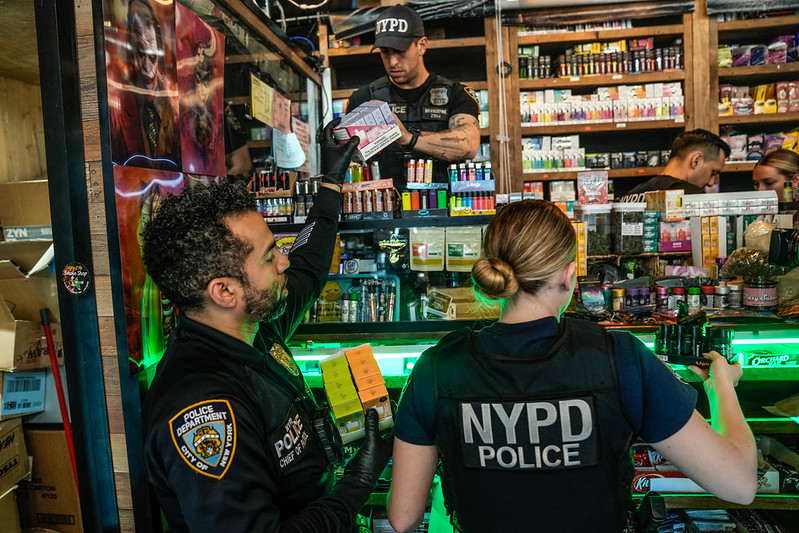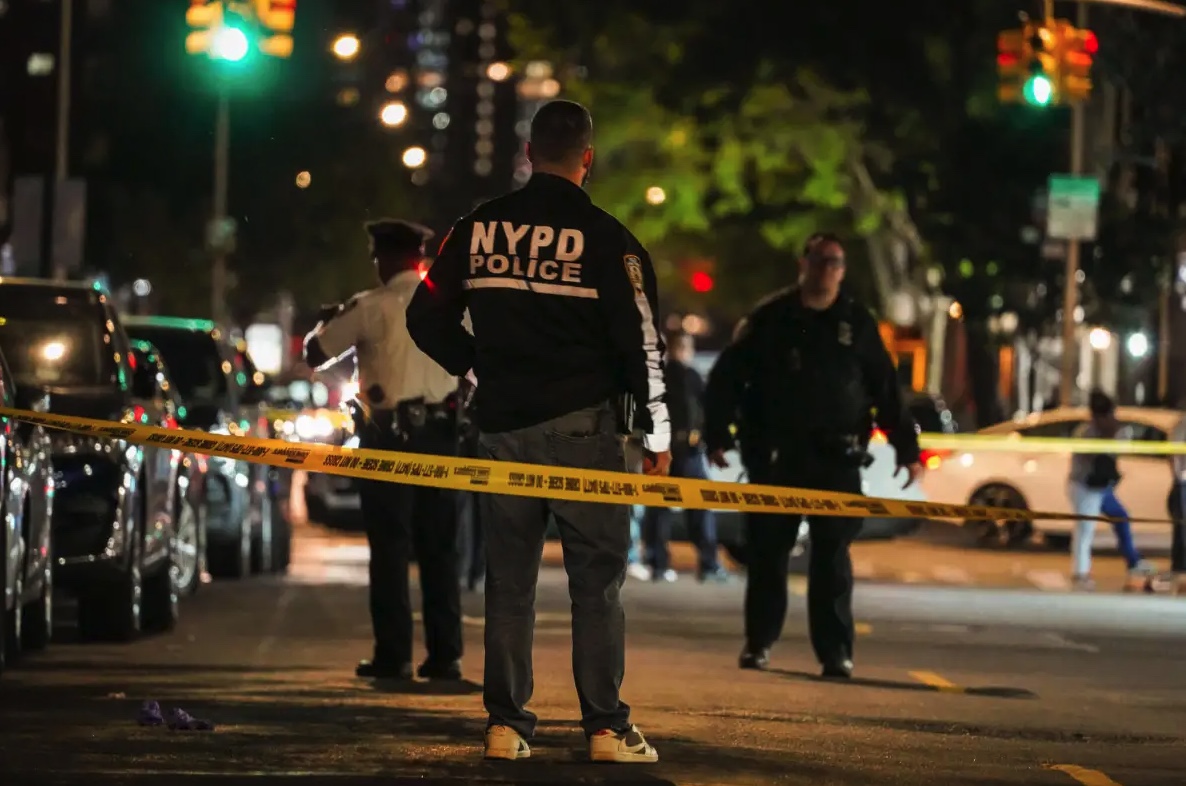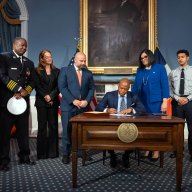By Kate Bobby
There's the mayor who packs a flask filled to the brim with 80 proof. There's the fire chief with a taste for arson. A factory manager with a healthy, wholly understandable fear of the INS. And they're headed for Manhattan's Theatre Row in January, in “Small Potatoes,” a two-act comedy penned by Queensborough Community College professor Bob Rogers.
“It's sort of like those Judy Garland-Mickey Rooney films, where they'd say, 'We have a barn. Let's put on a show!” joked Rogers in a reserved room of St. Paul and St. Andrew Methodist Church, an Upper West Side house of worship where he and director Martha Pinson are rehearsing the cast for “Potatoes' ” run at John Houseman Studio A, 450 West 42nd St., for Jan. 13-Feb. 20 with an opening night of Jan. 27.
The inspiration for “Potatoes” was twofold. It was inspired in part by “The Inspector General,” the classic comedy of errors by Nikolai Gogol. Likewise, years spent as a zoning board official in Putnam County, N.Y., also convinced Rogers to paint a funny, fictional portrait of local politics.
“Oh, I moved upstate as the classic, know-it-all city slicker hungry for small-town life. That's sort of where it all started,” said Rogers, who joined his town's zoning board as a way to introduce himself to his community, and in so doing, became drawn to the colorful microcosm that is small-town government.
“It's so involving. It's like a soap opera. You can find it taking over your life,” Rogers remarked with a laugh, nonetheless being sure to stress that any similarity to real persons living or dead is purely coincidental. That said, nonetheless, audience members who watched the play's debut production at the Depot Theater in Garrison, N.Y., begged to differ. Many of them approached Rogers afterward swearing they spotted in his play-or rather thought they spotted-people drawn from real life.
“They would come up to me and say, “This character must be based on so-and-so, or that character had to have been inspired by such and such a person. And the funniest thing is that all of these people were from different towns and none of them were from mine,” Rogers said. “At that point, I sort of realized I was onto something, that it would be a shame to stop there.”
And so he didn't. Rogers, taking on the role of playwright and producer, decided to bring “Potatoes” to Manhattan with the help of director Pinson.
“The first draft, which I saw in 1996, had a bit too much in it. In revisions, however, Bob made some great decisions, cutting things out and bringing other things out. And I saw it could go places,” said Pinson, who Rogers first met as a fellow student at an NYU screenwriting class.
“We haven't collaborated before this, but we've read each other's work and given each other advice as fellow writers. And since I've worked as a theater director and like Bob's work, he came to me with the script.
And Pinson knows a workable script when she reads one, having worked as a script supervisor for directors such as Martin Scorsese, Sidney Lumet and Brian DePalma.
“There is what's on the page, plus the interpretation. What the actors bring to it. The way I perceived the scenes in my mind, coming to it as a director and writer myself. A play is a collaborative process,” Pinson said. “After the response we received in Garrsion, we knew we had to bring it to the next level. We knew it could go to Manhattan.
“I'm having a hoot, really. I love the challenge of doing something new,” said Rogers with the same zeal with which he himself has approached a richly varied artistic career. Born on the Upper West Side, just a few blocks away from the church where the “Small Potatoes” cast is rehearsing, he attended Brooklyn College to study his first love, photography. Approaching it primarily as an art form, Rogers began to exhibit his work almost straightaway, featured in group shows at such esteemed venues as the Brooklyn Museum of Art, the Queens Museum of Art, the Soho 20 Gallery and the Marcuse Pfeffer Gallery, also in Manhattan. Concurrently, he pursued another love, that of teaching, signing on with Queensborough Community College in 1972.
“I love to touch people's lives, to inspire them, which I get to do through teaching,” said Rogers. “It always seems new to me. It's always exciting in a way that nothing else is.”
In addition to teaching at Queensborough, this Renaissance man has also taught as an adjunct professor at Brooklyn College, has written a series of articles on photography for major art journals and publications, and has written, produced and directed short films.
“I have always been drawn to new challenges. As a photographer, I like to try the latest camera, a new process. From there, I've taken it to the next level, making films. Which is sort of what led me to writing.”
Rogers, once again, enjoyed success in this latest endeavor, having sold a television script for the 1996 network series, “Swift Justice” and having optioned a screenplay, a thriller “Into the Fire,” a fifth-place winner for one writing contest and a finalist in several others. Enjoying a winning streak, Rogers brought his script to Hollywood and shopped it around.
“When I came back to New York, I kissed the ground,” Rogers said, summing up his decision to adapt his work for the stage as the quickest, most effective way of introducing his writing to larger audiences.
“Marketing is much harder for writers than the creative process itself. You have to spend more time marketing your work than latest endeavor, having sold a television script for the 1996 network series, “Swift Justice” and having optioned a screenplay, a thriller “Into the Fire,” a fifth-place winner for one writing contest and a finalist in several others. Enjoying a winning streak, Rogers brought his script to Hollywood and shopped it around.
“When I came back to New York, I kissed the ground,” Rogers said, summing up his decision to adapt his work for the stage as the quickest, most effective way of introducing his writing to larger audiences.
“Marketing is much harder for writers than the creative process itself. You have to spend more time marketing your work than writing it and that's tough because I hate parties,” he quipped. “When I was 5 years old, my parents threw me a birthday party… I went into the other room to read. That should give you some idea.”
Notwithstanding Rogers' impatience with the L.A.-way of getting things done, Rogers' solid streak of stick-to-it-iveness has stood him in good stead. With customary humor, he attributes his East Coast tenacity to an old tom cat with whom he used to bunk on the Lower East Side.
“This cat was always trying to break into the studio next door, and one day I heard this noise,” Rogers recalled. “I stuck my head out into the hallway and there was the cat ramming his head repeatedly into the locked door. Well, eventually the latch loosened and the cat did break in and I thought, 'Hey, I could learn something from this.”
“I guess I don't take 'No' for an answer either,” Rogers concluded with a smile. “I'm not sure what will happen with 'Small Potatoes,' but audiences seem to like it. So, we'll see. It could go further. It could end right here. It's the journey that's the key. I'm having a blast.”
“Small Potatoes” stars: Dan Anderson, Carla Bianchi, Michael Fegley, Jinn S. Kim, Lee Moore, Christopher Benson Reed, Genevieve Schartner, Anthony Spina and Eric Taylor. Previews for “Small Potatoes” start Jan. 13 with an opening night of Jan. 27. The performance schedule is Tues-Fri., 8 p.m. Saturday at 6:30 and 9 p.m. and Sunday at 3 p.m. Tickets are $37.50 ($25 during previews.) Call (212) 532-8887.





























